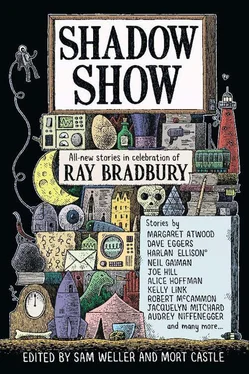Oh! I thought. How I wished I had written him back, all those years ago. How I wished I had kept up our correspondence.
But now more than thirty years have passed since I got my first letter from Ray Bradbury. And when Mort Castle wrote to me, suggesting that I write a “tribute” story, I couldn’t help but think of that old werewolf story I sent to Ray all those years ago. The first sentence and the last sentence are the same as they were when I was nineteen; the middle is infected with my middle age.
I am nearly the same age that Ray was when he first wrote to me—and that desperate twelve-year-old is very far in the distance. But I can see now how fully Bradbury has fitted himself into my brain. It is not just that he was a mentor to me at a time when I needed him most; it is also that his style, his mood, his way of thinking, has seeped into the very core of my work.
I don’t know whether “Little America” will seem like a “Ray Bradbury” story to readers; but I know for a fact that Ray Bradbury has a hold on my soul as a writer.
—Dan Chaon
THE PHONE CALL
John McNally
Dougie had been home from the hospital only an hour when Bob, Dougie’s uncle, opened the bedroom door and flipped off Dougie’s light without saying a word. The door creaked shut, and footsteps grew softer as his uncle retreated.
Dougie wanted the light back on. He was six years old and couldn’t sleep, his throat still pulsing from where his tonsils had been removed. In his room at the hospital he could at least turn on the TV or buzz for the nurse, whom he had fallen in love with, but here at home he had to remain in bed, and all there was to do was study his walls, which he had decorated with covers from his favorite magazine, Famous Monsters of Filmland . With the light out, he couldn’t even do that.
Dougie had no idea what time it was. He passed the hours thinking about Nurse Jill, who had long, straight hair like Susan Dey in The Partridge Family , and how she had rubbed her hand over his hair and said, “I know girls who’d kill for those curls.” She leaned close to him, almost to his mouth, and whispered, “But you probably hate them, don’t you?” With her mouth so close to his own, Dougie wanted to sit up and kiss her. Instead, he stared into her foam-green eyes until she touched his nose with the tip of her finger and stood up.
Dougie replayed that particular memory over and over, because if he let it fade away, it would be replaced by the man he saw right after he’d woken up after his surgery. The man lay motionless in the bed next to him—tubes running into his mouth, a machine beeping continuously, his skin the color of Silly Putty. When the doctor saw that Dougie had come to, he nodded angrily toward Nurse Jill, who swiftly pulled the curtain shut between them. Dougie, barely able to keep his eyes open, eventually fell back to sleep. The next time he woke up he saw two men wearing white shirts and white pants rolling the man out of the room, a blanket covering all of him, including his head, the way Dougie liked to sleep with a flashlight under the covers whenever he stayed awake to look at his magazines with their photos of Dracula and the Creature from the Black Lagoon.
“What was his name?” Dougie asked Nurse Jill later that day.
Nurse Jill smiled. “Mr. Belvedere.”
“Where’d he go?” Dougie asked.
Nurse Jill reached down and rested the tip of a finger inside one of Dougie’s curls. Testing the curl’s buoyancy, she said, “To a better place.”
A better place, Dougie thought now, in his bedroom, in the dark. Over the years Doug would meet other people, strangers mostly, with remarkably similar stories, of waking up in a haze of anesthesia next to a dead person whose soul was being spirited away. Did everyone have such stories? he would wonder.
The phone in the hallway rang.
The ring was so loud, Dougie’s heart sped up.
The phone continued to ring. Wouldn’t Uncle Bob or his mother answer it? Bob was his father’s brother, but Dougie didn’t remember anything about his father. The man had died when Dougie was still a baby. A hunting accident, he’d been told. No, his earliest memories of any man in the house were of Uncle Bob, who came sniffing around every few days like a stray dog, often spending the night.
On the fifth ring, Dougie slid out of bed and, feeling his way from one end of his room to the other, eased open his door.
In the hallway, Dougie could lean against the banister and see the living room below, where aquarium light sprayed gently up toward him, causing the walls to look like they were alive and moving, as though he were the one inside the fish tank. He picked up the phone.
“Hello?” he whispered.
A man called out from the earpiece: “Hello? Hello? Who is this? Is this Dougie?”
Dougie did not recognize the man’s voice. “Who are you?” he asked. And then a chill blew up under his pajamas, causing him to shiver. “Is this Mr. Belvedere?”
“Who’s Mr. Belvedere? Tell me about him.”
“He’s in a better place now,” Dougie said.
“He’s dead?” the man asked. “Did someone kill him?”
“He’s in a better place now,” Dougie repeated, but he felt like weeping this time because he didn’t know who this man was or why he was asking questions.
“Listen,” the man said. “I don’t have much time, and you won’t hear from me again for another couple of years, so I want you to do something for me, okay? I want you to remember who I am. I want you to pay attention. Because something terrible is going to happen, and only you can stop it.”
The harder Dougie cried, the worse his stitched and bleeding throat hurt. He began to moan from the pain.
“Don’t cry, Dougie,” the man said. “Don’t cry. I’m your friend. You have to believe me. I’m your…”
Dougie hung up and returned to his bedroom, leaving behind the room with walls that looked like they were breathing and a phone call he would barely remember in a week. He could have turned on his bedroom light now, but he was afraid to. He wouldn’t see those walls again until morning, when sunlight seeped through his curtains, waking all the monsters.
Thirty years later, Doug sits at the Tick Tock Lounge with a baker’s dozen of his coworkers from Rockwell International. The three tables they pushed together earlier in the night now harbor a collection of beer mugs and pitchers and shot glasses, glasses for highballs and martinis, peeled-off beer bottle labels and soggy napkins. Someone had slammed a beer down onto the last jalapeño popper, squeezing cheese out at both ends, causing it to look like a thick worm that’s been stepped on.
Across from Doug sits Louise Malgrave, who keeps touching Doug’s ankle with her toes and then acting as though it’s an accident.
“Is that you again?” she asks, smiling. She reaches over and taps his hand with her fingernails. She can’t not touch him, it would seem. “I’m sorry.” Louise is a supervisor at Rockwell, while Doug does data entry, typing in long strings of code that he doesn’t understand.
“It’s okay,” Doug says. He considers asking her to go home with him—why not?—but when he leans toward her, what comes out of his mouth surprises even him: “This is the anniversary of my mother’s death,” he says. He forces a grim, hopeless smile and, almost as an afterthought, adds, “She was murdered when I was fifteen.”
“Oh, no!” Louise says, and her face droops, as if sympathy and muscle control are incompatible. She looks a dozen years older now, and whatever vague plans Doug had with her in mind crumble before him.
What Doug has said is true—his mother was murdered, and today is the anniversary—but he can’t stand the way Louise is looking at him, the pity, the anguish, so he shakes his head and says, “I’m kidding.”
Читать дальше



![Lord Weller - Ритера или опасная любовь [СИ]](/books/421202/lord-weller-ritera-ili-opasnaya-lyubov-si-thumb.webp)








